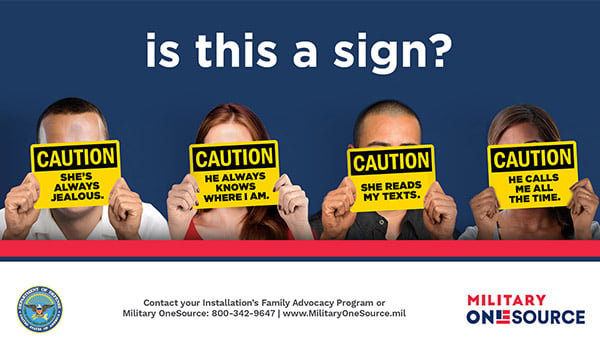
Ask the Flight Surgeon / By CPT (Dr.) Gurdeep Buttar: Military service presents unique psychological, social, and environmental challenges that can strain families and relationships within it.

ARMY.MIL photo
Of considerable public health significance is intimate partner violence (IPV). IPV encompasses a range of physical, sexual, or psychological harms or stalking behavior by a current or former partner along a spectrum of severity. According to the Centers for Disease Control (CDC), 1 in 4 women and 1 in 7 men will experience physical violence by their intimate partner at some point during their lifetimes. About 1 in 3 women and 1 in 6 men experience some form of sexual violence during their lifetimes. IPV affects over 10 million people in the U.S. each year with 5 million acts of domestic violence occurring annually to women 18 years old and older, and 3 million acts involving men. Productivity losses and costs attributable to IPV are significant, with 13.5 million workdays lost and $8.3 billion spent per year in the U.S. IPV accounts for 15% of all violent crime, of which 19% of these cases involved a weapon. However, only 34% of people who are injured by their partners receive medical care.
With respect to IPV, the U.S. military has considerably higher rates than the general population. Several studies estimate that IPV prevalence among male active duty service members range from 13.3-47% while among male Veterans, 13.5-42%. Among active female service members, the rates are 17-39%, and 21.9-74% for female Veterans. According to the VA’s Domestic Violence Task Force, the overall 12-month prevalence of IPV perpetration among active duty service members was 22%, and victimization was 30%. Unfortunately, IPV cases are thought to be severely under-reported.
In the 2017 annual Military Family Lifestyle Survey, 15% of military and Veteran family respondents stated they did not feel physically safe in their relationship. Most importantly, 87% of military spouse respondents did not report their physical abuse most often citing that they “did not feel it was significant” or they “did not want to hurt their spouse or partner’s career.” Ninety-one percent of Veteran spouse respondents did not report physical abuse citing embarrassment as their top reason. Other reasons for not reporting IPV include fearing spouses would lose financial support or benefits, lack of confidentiality, or fear for their own careers.
Risk Factors
Individual risk factors that lead to IPV include, but are not limited to low self-esteem, low socio-economic status, young age, heavy alcohol/drug use, low academic achievement, anger/hostility, antisocial & borderline personality traits, post-traumatic stress disorder, poor impulse control/aggression, prior history of being physically abusive, desire for power and control in relationships, prior child & sexual abuse, witnessing IPV between parents as a child, belief in strict gender roles, social isolation, unemployment, poor parenting and physical discipline as a child, and unplanned pregnancies.
UCMJ Offense
It is important to note, as of 2019, domestic violence is now a distinct offense in the UCMJ. Under UCMJ Article 128, any person who commits a violent offense against a spouse, intimate partner, or immediate family member with intent to threaten, intimidate (including psychological/emotional), or commit a violent offense against that person—has committed assault and shall be punished as a court-martial (forfeiture of pay, confinement, restraining order, reduction of rank, and dishonorable discharge). The perpetrator may also be subject to state and federal criminal/civil laws. Military/civil protective orders may be needed for your safety.
Prevention
So, how can IPV be prevented? There are a number of national resources available that include the following: the 24/7 National Domestic Violence Hotline (www.thehotline.org, 1-800-799-7233) and the National Coalition Against Domestic Violence (www.ncadv.org). Military resources include the Family Advocacy Program (FAP) that is available at every military installation (https://installations.militaryonesource.mil). FAP provides both clinical and non-clinical services to prevent and respond to domestic abuse, child abuse, neglect, and problematic sexual behavior in children and youth.
The DoD has a 24/7 Safe Helpline (https://www.safehelpline.org, 877-995-5247) and offers crisis support service affected by sexual assault. The VA has the IPV Assistance Program (https://www.socialwork.va.gov/IPV/Index.asp), which draws on resources addressing mental health, women’s health, primary care, and veterans’ justice outreach. Finally, the newly created Strength at Home Men’s Program (SAH-M) is a 12-week, cognitive-behavioral, trauma-informed group therapy program for active duty/Veterans who engaged in recent IPV.
Fly safe!
Questions?
If you have a question you would like addressed, email it to This email address is being protected from spambots. You need JavaScript enabled to view it..”>This email address is being protected from spambots. You need JavaScript enabled to view it.. We will try to address it in the future. See your unit flight surgeon for your personal health issues.
The views and opinions offered are those of the author and researchers and should not be construed as an official Department of the Army position unless otherwise stated.
CPT Gurdeep Buttar, M.D. is a flight surgeon at the School of Army Aviation Medicine, Fort Rucker, AL.










